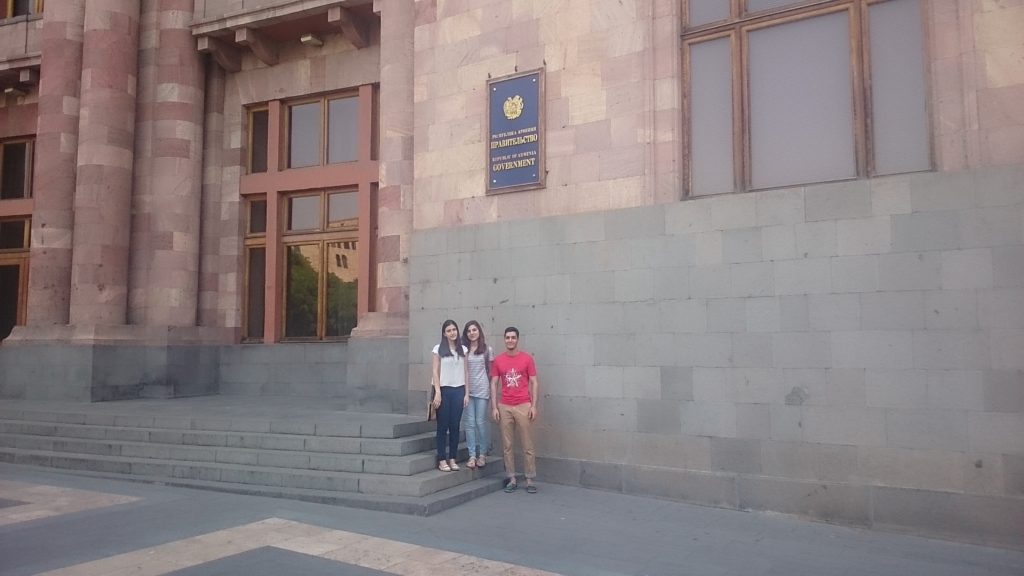YEREVAN–Ani Khachatryan is a recent graduate in biophysics from Yerevan State University. She develops computer simulations to predict the results of genetic mutations without the need for experimentation on live subjects.
The field is an emerging area in cancer detection and prevention research. In her spring 2017 semester, she participated in a US State Department-sponsored exchange program with the University of Memphis, which helped expose her work to the American academic community. Her presentation at a systems biology conference in Nassau County, New York earned her a summer internship at Harvard Medical School that summer. She currently has an admission offer to a masters program in biomedical informatics at Columbia University to continue her research.

Mariam Ghazaryan is a similarly ambitious young professional, who currently works at the Armenian Ombudsman’s office, which processes human rights complaints launched by citizens. Most recently she was working on cases launched with the European Court of Human Rights against Azerbaijan in consequence to the April 2016 four-day war. Looking to launch a career in international law, she has been accepted to the one-year LLM Masters in Law program at the University of Cambridge, which she pursued because it houses the Lauterpacht Centre for International Law and attracts experts in the field from across the globe.
Zhirayr Martirosyan, a business graduate from the American University of Armenia, was admitted to Columbia University. His internship with the Armenian Olympic Committee left him with the dream of modernizing Armenia’s sports federations and one day having a professional Armenian soccer team enter the Champion’s League. He was admitted to a masters program in sports management in September.
Unfortunately, Ani, Mariam, and Zhirayr might need to forego the opportunities they worked so hard for. They are three of 34 applicants who expected to receive Luys scholarships that would have covered up to 75% of their expenses on the condition that they return to work in Armenia or Artsakh for three years upon graduation (prior to this year, the funding level was 50% without the requirement to return to Armenia). Their plans were squared away and ready to go–that is, until April rolled around and the turbulent events that came with it.
The Luys Foundation was founded in 2009 to help Armenian students cover the financial burden of attending the world’s top universities. Its founders, Serj Sargsyan and Tigran Sargsyan, respectively Armenia’s President and Prime Minister at the time, decided to set it up as a private foundation with an independent board and not as an arm of the government. Initially, they provided scholarships to every Armenian student that was admitted to the top 25 universities in the world – as judged by one specific publication’s ranking. The goal was to fund every Armenian student that was admitted to this list of prestigious institutions. Due to limited resources, however, the eligibility criteria was soon scaled back to the top 10 universities, which, in 2018, included schools like Harvard, Stanford, and University of Chicago.
The foundation has funded over 500 scholars over the last nine years but its future came into question following Armenia’s peaceful revolution earlier this spring. On April 17, 2018, Serj Sargsyan was elected Prime Minister as Armenia transitioned from a presidential to parliamentary system, despite previous statements that he would not seek to remain in power after his second presidential term. Upset over the broken promise, on April 21, 2018, a group of around 60 Luys alumni published an open letter calling on Sargsyan, who still ran the Luys Executive Board, to step down as Prime Minister, especially in light of ongoing street protests. The letter did catch Sargsyan’s attention as he responded in an official statement underscoring his continued leadership as providing necessary stability given Armenia’s precarious national security environment.
Two days later, on April 23, as street protests amplified, he resigned anyway. On May 10, two days after Nikol Pashinyan was elected the new Prime Minister, it was announced that the Luys staff would be let go as the foundation reassessed its future. On May 29, the Luys Executive Board concluded to continue supporting the 70 current Luys scholars for at least one additional year but decided not to extend scholarships to the 34 new applicants who had not yet started at their institutions.
In consequence, Ani, Mariam, and Zhirayr were left in a very difficult situation. When their applications were canceled in May, some of their peers found other sources of funding, others rejected their admission offers and moved on. Ani, Mariam, and Zhirayr have not yet found alternative funding, but they still haven’t given up. Armenian banks won’t extend loans in the amounts that they need, even at exorbitant interest rates. US and British banks offer very little credit to international students. In desperation, Ani started an Indiegogo page to try to crowdsource the money she needed.
They have approached the new Pashinyan administration and various Armenian benefactors but with little luck. A government official told Ani that even the $200,000 that the government previously contributed to the Luys Foundation will be clawed back into the state budget this year as they explore setting up a new, similar scholarship program in the future.
The US-registered end of the operation, Luys Inc. has 501(c)(3) non-profit status. It now includes four alumni on a seven-member Board, who are trying to continue operations independently from the Yerevan-based foundation, whose future is uncertain. They are considering a transition plan which includes adopting a new name, strengthening transparency and accountability controls, and focusing fundraising specifically towards scholarships.

With deadlines looming, however, the students are running out of options. Ani and Zhirayr may consider deferring their admissions to Columbia for one year in hopes that a replacement for Luys might be set up in the meantime. However, deferral requires the payment of a deposit, which they are hesitant to commit to without any assurance that their situation will change over the next year. Mariam is not as lucky; Cambridge doesn’t allow deferrals. If she can’t confirm by July 31 that she can pay for her first semester, she will lose her spot and would need to go through the full application process again. Discouraged that not taking the offer might affect her chances of being accepted in the future, she does not see reapplying as a viable option.
The Velvet Revolution promises a new Armenia that will use the human potential of its next generation to forge a new path for the nation. If the mission of the Luys Foundation can’t be continued in one form or another, it would be depressingly ironic if it ends up also indirectly barring these three intelligent young people – and others after them – from using their talents to do just that.
Author’s Note: For full disclosure, I am a current Luys scholar one year away from completing a Master in Public Administration at Harvard University. Though I had top grades at my Toronto high school more than a decade ago, when applying to university engineering programs, I never considered applying to MIT or Stanford due to the financial burden. In those years, Luys did not exist yet. I ended up attending the University of Waterloo’s (self-declared) top engineering program in Canada. It was only after hearing about Luys and its scholarships that I decided to return to school to help launch my career to the next level.


Armenia is neither Norway nor Kuwait. Almost 30% of the country live in poverty, 5 to 10% in extreme poverty. If they are going to pay for this sort of projects then it has to be justified. The scholarship program has been working now for years. I would like to know how many of these young people who got scholarship have returned to Armenia, how many of those who returned actually work in their fields. It makes sense if they designate the scientific and technological fields that are needed in the country and help those students who want to study in those fields. Later, they can go back to Armenia and work in those fields. That could be a perfect investment but I am not sure if that has been the case so far.
Well, I just don’t understand why they don’t learn German or French and go study in France or Germany. Both Germany and France offer almost free education. There is no need to study in Anglo Saxon universities where education is very expensive. In France and Germany you pay no more than 500 euros per year instead of 50.000 per year for Anglo Saxon universities. Armenia should not waste money on these students, because if they are really that smart why don’t they learn German or French in order to save Armenia’s money? That money could be used for creating businesses and therefore new work places.
For every student that Luys helped, there were two others whom it screwed over by conveniently finding an excuse not to honor its commitment and pay the scholarship. The program should be closed down, provided that it gives appropriate notice so that students (like the ones in this article) who relied on Luys’s promises don’t find themselves screwed over.